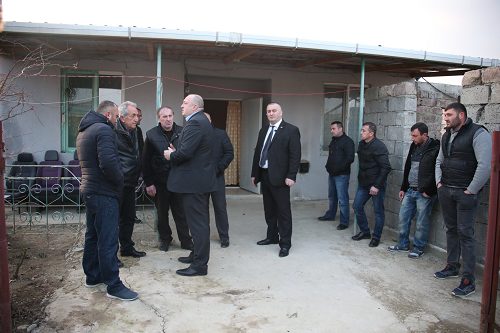
Tbilisi Lays Responsibility on Russia over Georgian Citizen’s Death

President Margvelashvili visited Tatunashvili’s family in Tsilkani settlement. Photo: facebook.com/PresidentMargvelashvili/
Official Tbilisi reacted on February 23 to the news of Georgian citizen Archil Tatunashvili’s death at the hands of Russian-backed Tskhinvali authorities’ security force following his detention on February 22.
The Georgian Foreign Ministry expressed condolences to Tatunashvili’s family and condemned “criminal actions of the occupation regime” that led to his death. The MFA also said that it had information about two other Georgian citizens detained by Tskhinvali security force, which styles itself as “the KGB.” The names of the citizens in question are Levan Kutashvili and Ioseb Pavliashvili.
The MFA stressed that the Russian Federation was directly responsible for the death of Tatuashvili “as the power exercising control on the ground.” The Ministry also said that the criminal actions by the occupation regime “make clear the urgent necessity to create on the ground international mechanisms for human rights and security.”
The Foreign Ministry called on the co-chairs of the Geneva International Discussions (GID) to “react in a timely manner to immediately establish the circumstances of Archil Tatuashvili’s death, for the detained individuals to be immediately freed, and for this gruesome fact to receive an adequate reaction.”
The MFA added that Russia’s “illegal provocative actions,” including installment of barriers on the occupation line, restrictions on the local residents’ freedom of movement, detentions, human rights violations and ethnic discrimination, “further complicate the difficult security and humanitarian situation on the ground,” while being a source of destabilization.
Georgian President Giorgi Margvelashvili commented on Archil Tatunashvili’s death during his meeting with Danish Foreign Minister Anders Samuelsen, saying that the victim “was a Georgian soldier who served global peace and security in international missions,” and who had been “kidnapped and killed” in the occupied region.
President Margvelashvili visited Tatunashvili’s family in Tsilkani settlement of internally displaced persons. He called the incident “a totally disgusting murder,” which “added a great pain to the tragedy of our country’s occupation.”
Prime Minister Giorgi Kvirikashvili issued a statement, saying that information regarding the death of Tatunashvili and detention of two other citizens would be “immediately provided to the European Union Monitoring Mission and Geneva International Discussions co-chairs.” According to the statement, the Georgian Ministry of Internal Affairs started investigation of illegal restriction of freedom and murder. The Prime Minister also called for “establishment of international human rights and security mechanisms on the ground.”
The Office of the State Minister for Reconciliation, Ketevan Tsikhelashvili issued its own statement, saying that “the life of another person fell victim to the occupation regime,” and adding that the EUMM and co-chairs of the GID have been informed “for a proper reaction to be given to this gruesome incident, responsibility for which lies, first of all, with the Russian Federation and the occupation regime.”
Georgian State Security Service denied the claim made by the Russian-backed Tskhinvali authorities that Tatunashvili had been working for the Georgian security agencies, adding that the request for a Georgian expert to be allowed to examine Tatunashvili’s body had been rejected.
Meanwhile, Sergi Kapanadze of the opposition European Georgia party voiced an initiative in the Parliament for an “Otkhozoria List” to be adopted by the Georgian legislature that will include individuals that have had a part in murder of Georgian citizens. According to Kapanadze’s proposal, the persons included in the list will be sanctioned by Georgia’s foreign partners and will be denied social benefits that Georgia normally offers to the residents of its two occupied regions.
Archil Tatunashvili’s family members told Rustavi 2 TV journalists that he went to visit his own house in Akhalgori on February 22, but then they “lost contact” with him. They also said that Tatunashvili crossed into the occupied Akhalgori Municipality periodically. Nugzar Tinikashvili, the head of the exiled administration of Akhalgori Municipality, told journalists that Tatunashvili had been selling fruit and vegetables in Akhalgori.
At the same time, an anonymous source from the occupied Akhalgori told the Georgian edition of Radio Liberty that a verbal conflict had occurred at the occupation line between Archil Tatunashvili and members of Tskhinvali armed groups.